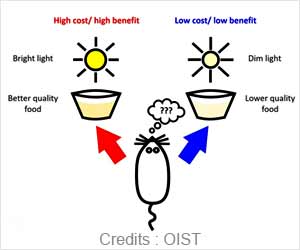Recent research indicates that the decision-making abilities of college students may have been adversely impacted by the COVID-19 pandemic.

Poorer decision making among college students during the COVID-19 pandemic: Evidence for "pandemic-brain"
Go to source).
‘New research suggests that the COVID-19 pandemic has had a detrimental effect on the decision-making capabilities of college students, including those who are set to graduate this spring.
’





Advertisement
How the Pandemic Shaped Decision-Making in College Students?
The researchers compared responses to a hypothetical situation made by students during the pandemic to responses made by students in earlier studies. They found evidence that students in 2020 were more likely to cycle between going with their gut and more thoroughly mulling over their answers depending on how the scenario was described.“Our theory is that feeling stressed by everything going on was limiting students’ resources to really evaluate the information that was presented to them,” said lead author Melissa Buelow, professor of psychology at Ohio State’s Newark campus.
The research also suggests that the prolonged and wide-ranging uncertainties that came with the global lockdown – far different from an acute stressor imposed in a lab – affected the brain region responsible for problem-solving and decision-making.
“I think that is one of the more important findings – that the stresses of everyday life can wax and wane, and they can potentially overwhelm your cognitive resources and you can see real downstream effects on everyday activities that require your energy and your effort,” Buelow said. “This study provides additional information to understand why students may have been having difficulty coming to class, focusing on class, and getting things turned in – because there was this global event affecting every part of their lives.”
Advertisement
Understanding the Challenges Faced by the Graduating Class
Buelow conducted the study with Ohio State Newark psychology faculty members James Wirth and Jennifer Kowalsky. The research was published recently in the Journal of American College Health.In autumn 2020, students on Ohio State’s campuses attended classes offered both virtually and in person with reduced density and continued physical distancing, wearing masks and undergoing routine COVID-19 testing. Students were presumed not to be infected with the coronavirus when they participated in this research.
Buelow and her colleagues were inspired to do the study after they referred to their own foggy thinking as “pandemic brain” in casual conversation.
“We said if we are experiencing this, we wonder if others were as well,” Buelow said. “And as we were collecting data, we heard in the popular press about this idea of the stress of COVID leading to difficulty with thinking, processing information and making decisions.”
A clinical neuropsychologist, Buelow has used the Adult Decision Making Competence (ADMC) scale in her research for a decade. The tool presents numerous scenarios, framed in both positive and negative ways, and asks users to respond with their preferred solution or recommendation.
Advertisement
Weathering the Pandemic Storm
For this study, researchers compared data from a pre-pandemic sample of 722 undergraduates who had been assessed with the ADMC scale to data from 161 students who participated in one of two assessments during the 2020 fall semester.The main finding: Instead of recognizing that ethics-based scenarios resulted in the same outcome whether presented as a gain or loss, students in 2020 were more likely to answer differently based on how the information was framed.
“Reliance on whether ‘this is a win’ versus ‘this is a loss’ really factored into decision making,” Buelow said.
Despite that inconsistency, the researchers noted that students in 2020 were as confident as pre-pandemic participants that their decisions on accuracy-based questions were correct.
“That struck us as interesting, with potential implications for the health and well-being of individuals adequately perceiving risk,” Buelow said. “Are individuals aware of what they do and don’t know, so to speak? And if you aren’t, does that lead to more risk?”
Navigating Uncertainty Amidst the Crisis
The researchers assessed another 72 students at two time points during the spring 2022 semester to gauge whether COVID-19 vaccination and loosened mask and distancing requirements lessened the pandemic’s effects on decision-making. Their exploratory analysis with this smaller sample found that students were still making less consistent decisions compared to pre-pandemic participants.Buelow and colleagues are continuing to collect data to track changes in student decisions made over a longer period.
“Situational factors can affect why people make a good, advantageous decision versus a bad or risky decision, and that is an important context to have,” she said. “When we acutely stress individuals in the lab, we see a subsequent lowering of decision-making consistency. These findings really fit in with that – so we can theorize, in the absence of an acute lab stressor, that it was COVID, a much more global factor affecting every aspect of our lives, that affected cognition.”
Reference:
- Poorer decision making among college students during the COVID-19 pandemic: Evidence for "pandemic-brain" - (https://www.tandfonline.com/doi/full/10.1080/07448481.2023.2186129)
Source-Eurekalert








